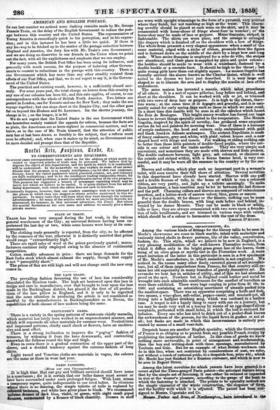AMERICAN AND ENGLISH POSTAGE.
IN our last number we noticed some dashing remarks made by Mr. George Francis Train, on the delay of the English Government to reduce the post- age between this country and the United States. The representative of Young America is exceedingly quick in his perception, and in his expres- sion; and in this instance he has been a little too quick. If there is any lee-way to be fetched up in the matter of the postage reduction between England and America, the duty lies with Mr. Train's own Government; and we are doing no disservice to our friends in the Union when we point out the fact, with all the explicitness and emphasis that we can employ.
For many years, the British Post Office has been using its influenze, and generally with much success, for the purpose of inducing other Govern- ments to consent to reductions in the postage with this country. There is one Government which has more than any other steadily resisted these efforts of our Post Office, and that, we do not regret to say it, is the Govern- ment of the United States.
The practical and existing result, however, is a sufficiently absurd ano- maly. For some years past, the total charge on letters from this country to any one of our colonies has been 6d., and this rate applies, of course, to our correspondence with the whole of British North America. Two letters are posted in London, one for Toronto and one for New York ; they make the sea voyage together; but one stops short at the Empire City, and the other goes far on beyond the Hudson and St. Lawrence. On the shorter journey, the charge is Is. ; on the longer, it is 6d.
We do not regret that the United States is the one Government which has heretofore mainly resisted the appeals for reform, because the facts are so plain, the Americans are so keen-sighted in commercial matters, and we know, as in the case of Mr. Train himself, that the attention of public men has at last been drawn so forcibly to the subject, that a reform must soon be effected; and, when once it makes up its mind, no Government can be more decided and prompt than that of the Republic.


























 Previous page
Previous page